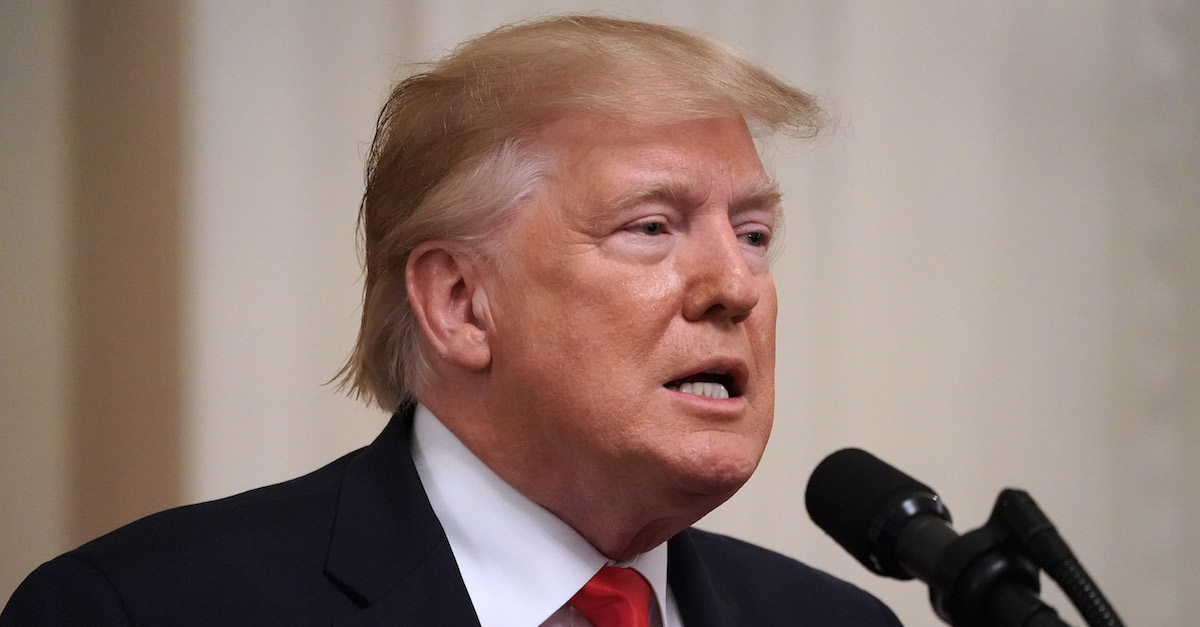
The White House knew President Donald Trump‘s July 25 phone call with Ukrainian President Volodymyr Zelensky was trouble with a capital T as soon as the secured line clicked into silence.
According to CNN, “nervous word spread among national security aides about the contents” of the phone call which Trump has personally described as “perfect” on numerous occasions.
But the president’s request for an investigation into Joe Biden and his family was immediately deemed a potential political quagmire, according to various anonymous sources who are reportedly familiar with the White House “scramble” to minimize that call’s fallout.
The call even upset Trump’s own top brass. Per that report:
At least one National Security Council official alerted the White House’s national security lawyers about the concerns, three sources familiar with the matter said, a detail that had not been previously disclosed. Those same lawyers would later order the transcript of the call moved to a highly classified server typically reserved for code-word classified material.
The National Security Council official’s concern tracks with–and is independent of–the complaint later brought by the intelligence community whistleblower and suggest a deep sense of malaise within the upper echelons of Trumpworld about the president preconditioning foreign aid on an investigation into his political rival.
And it wasn’t just one official expressing their concern. Again CNN:
Almost as soon as Trump had hung up, word of what he said on the call began to circulate among National Security Council staffers — in particular, his request that Zelensky investigate Biden. The entreaty caused concern among some of his national security officials, who discussed among themselves whether Trump had crossed a line.
Eventually, the internal consternation escalated. Within roughly a week, the top lawyer at an intelligence agency had contacted John Eisenberg, the top lawyer on the National Security Council, to discuss concerns raised by an intelligence officer through a colleague about a phone call Trump had held with a foreign leader, though didn’t specify the country in question.
This latest development also reflects a mounting body count of highly-placed people–who clearly lacked anti-Trump axes to grind–expressing their concern with the president’s allegedly untoward actions vis-à-vis Ukraine and his desired investigation into the Bidens.
“In case there was any remaining doubt that this was all the result of a lone anti-Trump official, every new story that emerges and every text that gets disclosed reaffirms how everyone outside of the president’s most loyal allies viewed his behavior as crossing the line,” said national security lawyer Bradley P. Moss in an email to Law&Crime. Moss works for the law firm representing intelligence community whistleblowers.
And the concerns at the White House weren’t kept close to the national security chest, per CNN.
“Unsettled aides also immediately began quizzing each other about whether they should alert senior officials who were not on the call — mainly those at the Justice Department, since Trump had invoked the agency’s boss, Attorney General Bill Barr, multiple times during the 30-minute talk,” the report notes.
Trump’s inner circle making a mad dash for guidance and secrecy underscores the veracity of the initial whistleblower complaint, experts say.
“If in fact those surrounding Trump were immediately concerned with the tenor of Trump’s call and made efforts to conceal the call, these facts further corroborate the whistleblower’s contentions,” Julie Rendelman, a former prosecutor and current defense attorney said via email.
Rendelman, who also serves as a host on the Law&Crime Network, said this news is “contrary to any notion on the part of the President that there was simply nothing wrong with the call.”
Bob Bianchi is also a former prosecutor and current defense attorney who hosts on the Law&Crime Network. In an email to Law&Crime he described the unease at 1600 Pennsylvania Avenue as “remarkable.”
“Officials from all levels of the administration recognized this was not a ‘perfect call’ and went into lockdown mode because they took it as a potential violation of law,” Bianchi said. “It also shows a concerted attempt to cover up this data from the public and Congress [and] explains the release of the notes of the call in advance to get ahead of the story.”
“The call also shows that those at the highest levels of the administration did not view the call as the singular time the president attempted to address ‘corruption’ as suggested in the narrative now given,” Bianchi continued, “but rather, that those with knowledge of the call saw it as a violation of law and went into panic mode after that ‘perfect call.'”
[image via Chip Somodevilla/Getty Images]